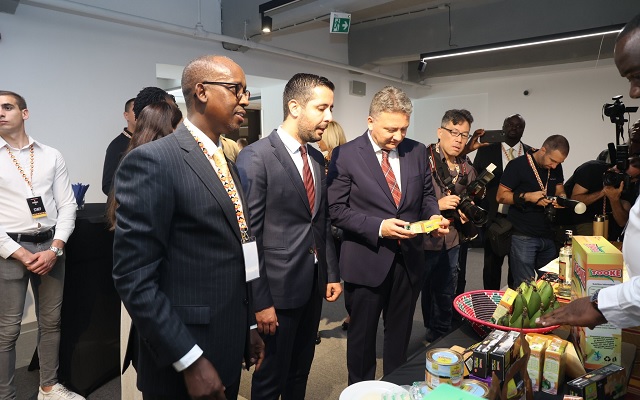
It makes perfect sense for two complementary economies that each produce things that the other does not and cannot
COMMENT | ODREK RWABWOGO & BRATISLAV STOILJKOVIC | The agreement signed between the two countries in Belgrade last week has breathed new life into a little-known but in fact, long-standing and increasingly fruitful partnership.
It’s not often you see an African leader travel to southeastern Europe on a state visit.
Yet, just this July, President of Uganda Yoweri Museveni met his Serbian counterpart Aleksandar Vučić, officially opening Uganda’s new, Belgrade-based trade hub, and signing a number of agreements promoting trade between the two countries.
For agriculture-dominated Uganda, aggressive growth of export revenue has been identified as critical to its economic recovery and the ultimate goal of the East African country’s further industrialisation. Serbia has emerged as an important, if at first look surprising, partner of choice.
Typically, when it comes to trade, African countries tend to focus their efforts on places such as the UK or the EU, with whom many have long-established links. And this is not that different at all.
Uganda’s “new” pitch toward Serbia is no such thing. In fact, the two countries already enjoy long-standing ties reaching back to the establishment of the Non-Aligned Movement (NAM), which Serbia as part of the former Yugoslavia helped to found, and of which Uganda takes up the chairmanship later this year.
The movement has been going through a revival in recent years, as many countries wish to stay neutral and outside of the increasingly polarising power struggles between the East and the West.
To such countries, NAM offers both a safe haven and a network that dates back to the Cold War era, and today represents a ready-made club of shared connections.
Serbia also offers a unique gateway to markets for so long inaccessible to Africa. In a unique position of holding Free Trade Agreements (FTAs) with the EU, Turkey, and the UAE, the Balkan country offers a unique entry point for Ugandan products such as coffee, fresh produce and cocoa.
The regional “mini-Schengen” initiative, Open Balkan, that Serbia is a part of, only expands the market potential further.
Once a direct transport link between Belgrade and the Ugandan key transportation hub Entebbe is established which Air Serbia and Uganda Airlines intend to do through a codeshare agreement next year there will be a new, direct commercial and cargo route from Africa to Europe and onwards to all of Serbia’s regional FTA partners.
There are also business opportunities for Serbia in the opposite direction.
Uganda has one of the world’s fastest-growing media markets, powered by a population with a median age of 17. Serbia’s media sector and film and TV industry dominate the Balkan region but have little room to expand there.
There is a construction and infrastructure boom in Belgrade, and similarly in Uganda where Serbian companies such as Energoprojekt dating back to Yugoslav times are already well established.
Moreover, Uganda is a complementary economy to Serbia, meaning the two produce things that the other does not and cannot.
The climate in Serbia doesn’t allow growth of a single pineapple, banana, or coffee bean any time of the year. In Uganda, these products can grow all year round.
This is why the two economies are not competitors on the global market, and that means there is a lot they can offer to each other.
But it is, perhaps, value addition in the Ugandan coffee sector processing coffee in Uganda before export where Serbia can contribute the most, and reap the greatest reward.
European tariffs are so exceptionally high, it is actually cheaper to produce freeze-dried coffee in high-wage Germany than it is to create a single job in the coffee processing industry in sub-Saharan Africa.
It may be surprising to know that Germany is in fact the world’s largest exporter of freeze-dried instant coffee.
This country, which also cannot grow a single bean, outpaces almost the entirety of coffee-producing Africa for income made from the coffee business.
Germany has no special technology that others do not possess. The simple reason why they’re number one in this industry are the punitive EU import tariffs that have stopped the import of anything other than raw coffee from Africa into Europe in its tracks.
This means the value-addition sector has been hobbled for decades by a trade policy made elsewhere in the name of free trade but which is in fact protectionism, pure and simple.
But this is changing. The UK has recently unveiled highly generous and advantageous new trade tariffs for Africa, which will enable the import of coffee processed in Africa to the fifth-largest world economy.
In time, this is set to lead to increasing pressure on the EU to change its own prohibitive trade policies.
And this is where the opportunity lies for Serbia. The country’s coffee sector which itself is large, is now intending to offer, through investment and joint ventures, one of the first opportunities for Uganda since independence to develop its own processing industry.
More will follow in other key locations including the UK, US, and Dubai. But the agreements signed in Serbia on July 31 lay the foundations for all the rest while breathing new life into a little-known, but in fact long-standing and increasingly fruitful partnership.
*****

Odrek Rwabwogo is a Ugandan farmer and Chair of Uganda’s Presidential Advisory Committee on Exports and Industrial Development (PACEID), and Bratislav Stoiljković is a Serbian entrepreneur and Uganda’s trade representative to southeastern Europe.
Source: Euronews
 The Independent Uganda: You get the Truth we Pay the Price
The Independent Uganda: You get the Truth we Pay the Price



